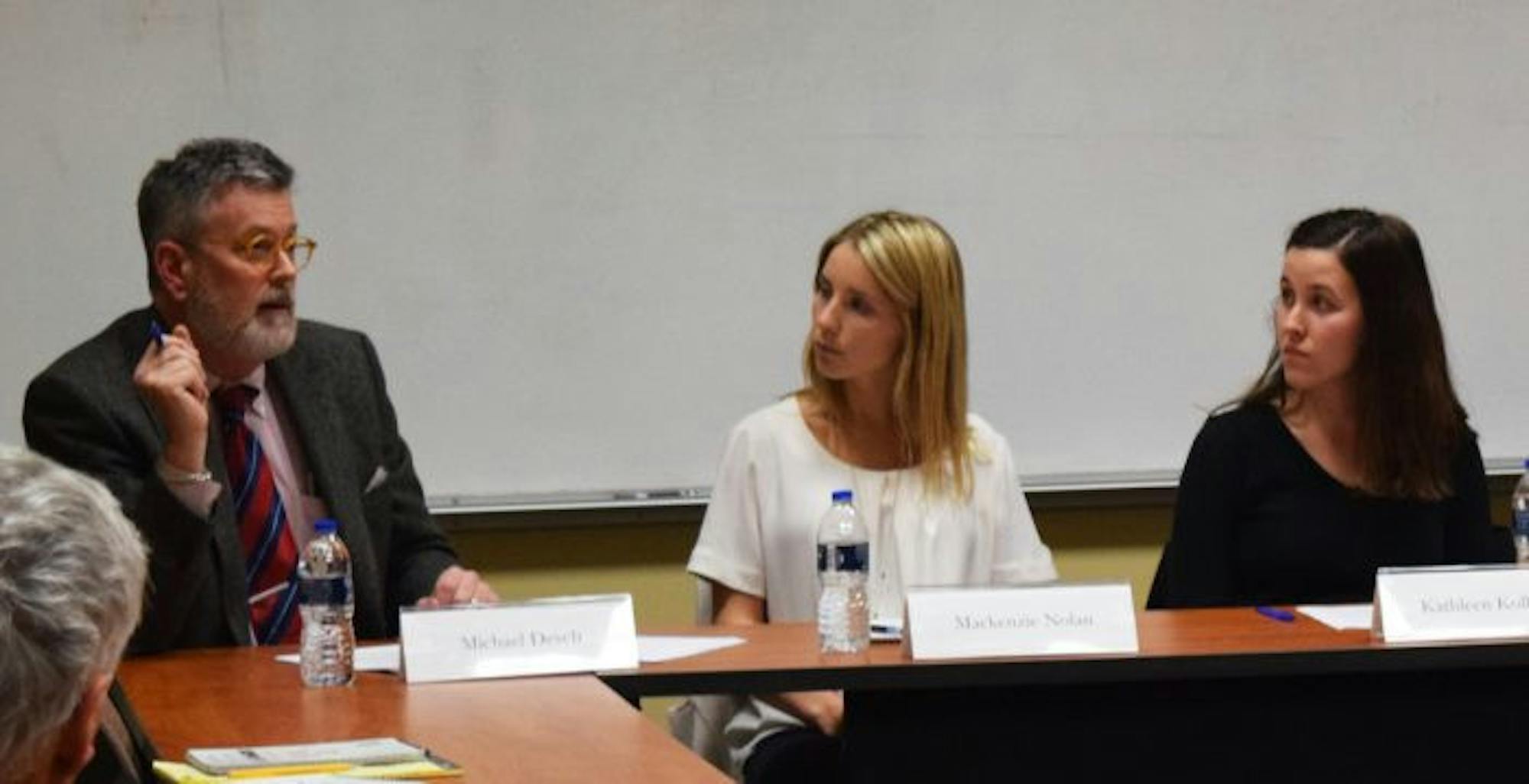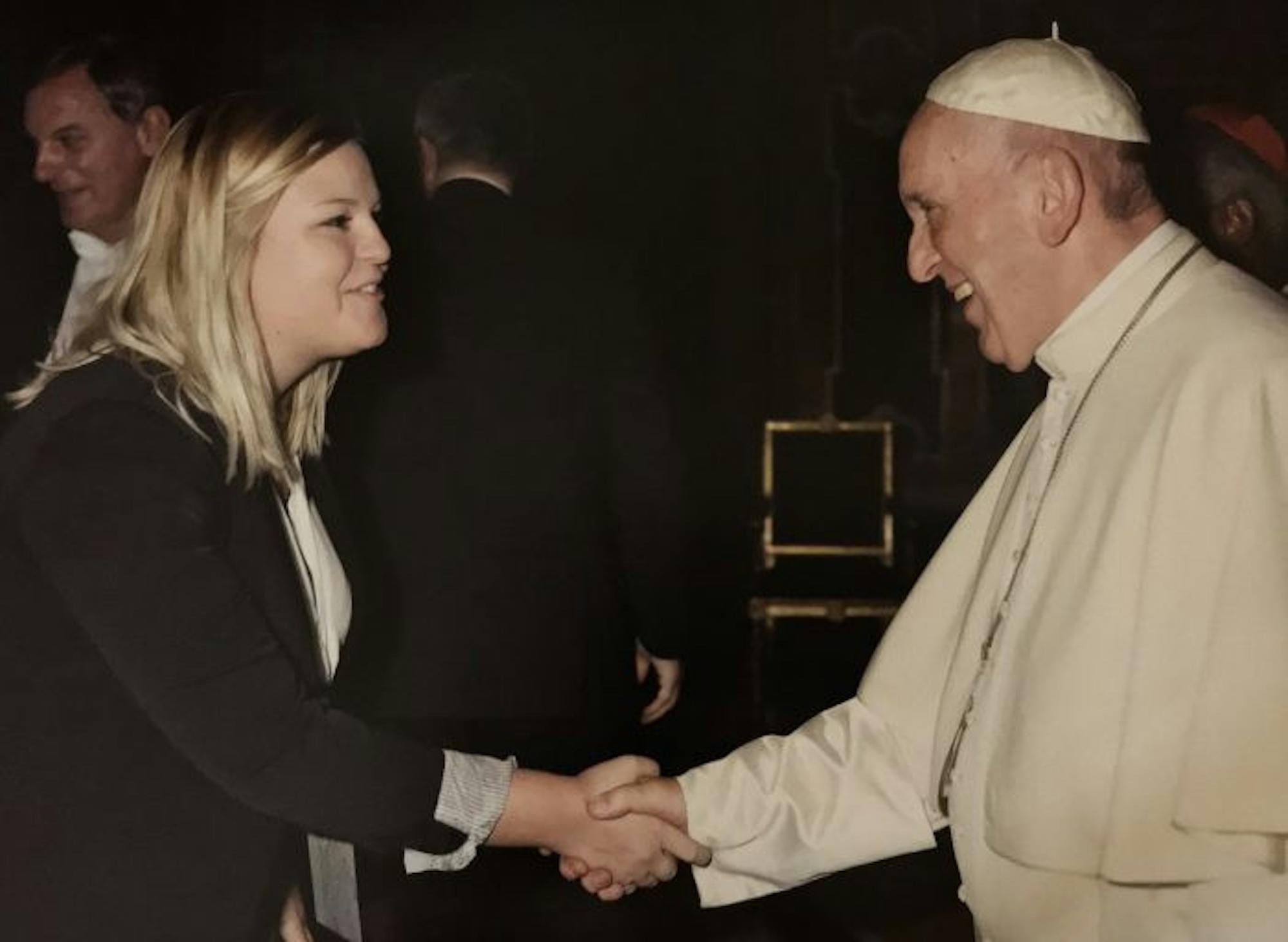Twelve Notre Dame students and recent alumni and five faculty members travelled to the Vatican to meet the pope and attend a conference on a topic that continues to dominate headlines: nuclear weapons.
“This was probably the most public and high-level event on this issue since the end of the Cold War,” Gerard Powers, director of Catholic peacebuilding studies at the Kroc Institute for International Peace Studies, said. “After the Cold War, the Holy See was increasingly outspoken about the immorality of the use of nuclear weapons. This is the first time that a pope condemned not only the use, but the possession of nuclear weapons.”
In a panel hosted Tuesday night, the group discussed their experiences at the Vatican, as well as Pope Francis’s condemnation of nuclear weapons.
For the group that traveled to the Vatican, the highlight of the visit was meeting personally with the pope, Powers said. The pope met with over 300 strangers, yet greeted each one with so much energy it seemed as though he was greeting the first, Powers added.
Chris Haw, a doctoral student in theology at the Kroc Institute, echoed Pope Francis’s message in support of nuclear disarmament and said the conference helped him solidify his stance.
“Even with what we have … one of the overarching themes is that they are sapping our world of resources and that they are now increasingly destabilizing us,” Haw said. “We need to come to grips that they are increasingly destabilizing international diplomacy.”
The use of nuclear weapons was utopian, shortsighted and irrational, Haw said.
“Deterrence is building on sand, increasingly building on sand,” he said. “Lasting peace is built by vigilant diplomatic efforts and human development.”
Haw said in one sense “the multi-national chorus of peace-builders was even more thrilling than meeting the pope.”
“We’re all connected in that whether we destroy or safeguard nature, our fear or our courage, all of these things affect our brothers and sisters,” he said. “We’re living amidst a moral emergency for which we are all co-responsible. We in the nuclear countries live in a haze of moral deprivation and logic distortion. If we don’t change, things won’t change.”
Political science professor Michael Desch challenged Haw’s stance.
“In general, it was a terrific couple of days. And the high point of the audience with the Holy Father is something I know I’ll never forget,” Desch said. “In terms of the concrete message of the conference, I came away not convinced.”
Desch said nuclear deterrence is not a theory of nuclear use. Rather, it is a theory of purposive non-use of nuclear weapons.
“Deterrence is not nuclear use, and we shouldn’t forget that,” he said. “The position of the Church … wrongly assumes that counter-value or population targeting has been a part of U.S. nuclear strategy for most of the Cold War. On that score they’re fundamentally wrong.”
There has been significant nuclear drawdown since the Cold War, Desch said.
“There’s still plenty of nuclear power out there, but the idea that nothing has changed is very hard to sustain,” he said. “We now have nine nuclear powers. This is a bad thing in one sense, but in another sense we could have a world, and we expected a world of 50 nuclear powers back in the days of proliferation studies. At least five states have walked back from pretty serious nuclear programs.”
Desch said he is a realist and thinks it is idealistic to believe a world without nuclear weapons could become reality.
“I was very unpersuaded by the integral nuclear disarmament view that everything is connected,” he said. “It seems to me hard to sustain the argument that if there weren’t nuclear weapons that huge amounts of money … that if we cut this out we would be spending a lot of money on other worthy causes, particularly the elimination of poverty. The bottom line for me is we ought to be careful what we wish for.”
Junior political science and Arabic major Mackenzie Nolan said the discussion with nuclear weapons does not just stop at deterrence. What is necessary now, she said, is education.
“We were lucky enough to go to this conference, and I think it’s our responsibility now to bring it back to campus,” Nolan said. “We all have different backgrounds, so I think understanding those backgrounds will help improve discourse.”
Graduate student at the Keough School of Global Affairs Kathleen Kollman said students should be educated on the gravity of the threat of nuclear weapons. Until then, she said, students cannot selectively focus on sole issues such as mass migration or climate change.
“Unfortunately we don’t have the luxury of focusing only on those issues. The issue of nuclear weapons stands in our way,” Kollman said. “What it took for me to care was a wake-up call from reality that the threat from nuclear weapons is far from over.”
University group attends Vatican conference on nuclear weapons
Professor Michael Desch and University students Mackenzie Nolan and Kathleen Kollman discuss their recent trip to the Vatican. The group met the pope and attended a conference focused on nuclear disarmament.
Junior Monica Montgomery shakes the pope’s hand while on a trip to the Vatican. Montgomery joined 11 other University students, alumni and five faculty members in attending a conference hosted by the pope.









